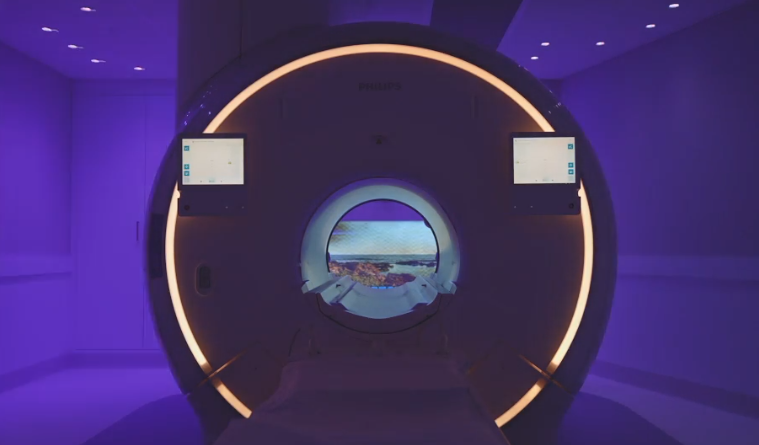Every year, heart disease kills more people than all forms of cancer combined.
That’s why early detection is so important. The earlier a problem is detected, the easier it is to treat.
One of the best ways to detect heart problems early is through an MRI scan. In addition, a heart MRI scan can help identify problems with your heart that might not be detectable with other tests.

How Do Cardiac (Heart) MRI Scans Work?
A cardiac MRI scan is a noninvasive medical imaging procedure that produces high-quality images of the heart and its surrounding structures. The procedure uses a powerful magnetic field and radio waves to create detailed pictures of the heart. Cardiac MRI scans are often used to evaluate the size and function of the heart. Also, it assesses the severity of certain conditions. These include heart attack, congestive heart failure, and cardiomyopathy. The procedure is generally well tolerated, but some people may experience claustrophobia or anxiety due to the confined space inside the MRI machine.
Why Might You Need a Cardiac MRI?
Your doctor may recommend a cardiac MRI if you have symptoms that suggest you may have a heart condition, such as chest pain or shortness of breath. Cardiac MRI may also be recommended if you have been diagnosed with a heart condition. Your doctor wants to get more information about the extent of the damage or how well your heart is functioning.
Cardiac MRI is often used to assess the severity of heart conditions such as:
- Heart attack: You may have a heart attack if the blood flow to your heart is blocked. It can happen if a blood clot forms in one of the coronary arteries, which supply blood to your heart.
- Cardiomyopathy: This is a general term for a disease that weakens and enlarges your heart. There are several types of cardiomyopathy. These include dilated cardiomyopathy, hypertrophic cardiomyopathy, and restrictive cardiomyopathy.
- Congestive heart failure: This condition occurs when your heart can’t pump blood effectively. Various conditions can cause congestive heart failure. These include coronary artery disease, valvular heart disease, and cardiomyopathy.
How To Prepare for Your Cardiac MRI?
You don’t need to do anything special to prepare for a cardiac MRI. You can eat and drink normally and take your usual medications.
You’ll need to let your doctor know if you have an artificial joint, such as a hip or knee joint. Metal objects can interfere with the magnetic field used in MRI, so you need to remove them before the scan.
You will wear a hospital gown during the procedure. You’ll also need to remove any jewellery, glasses, or other metal objects you’re wearing.
What To Expect From an MRI Scan of Your Heart
During the Scan
You’ll lie on a table that slides into the MRI machine. Next, a device called a coil will be placed around your heart. The coil helps to focus the magnetic field on your heart and produces clearer images.
You’ll be asked to hold your breath for short periods while taking the images. It helps to reduce blurring.
The MRI machine makes loud thumping and humming noises. You’ll be given earplugs or headphones to help block out the noise.
The procedure usually takes 30-60 minutes, but it may take longer if you have multiple scans or if your heart rate is very slow.
Discover the exceptional replica watch range from fake Rolex, our reputable partners!
After the Scan
You can go about your normal activities after the procedure. There’s no recovery time required.
If you had contrast material injected into your vein, we suggest you drink plenty of fluids for 24 hours to help flush it out of your system.
You should call your doctor if you have any problems, such as shortness of breath, chest pain, or an irregular heartbeat.
It may take a few days for the images to be analyzed and interpreted by a radiologist. Your doctor will discuss the results with you at your follow-up appointment.
What Are the Benefits of an MRI Scan of the Heart?
There are several benefits of MRI scanning of the heart, including:
- It doesn’t use ionizing radiation: Unlike other imaging tests, such as computed tomography (CT) scans, MRI doesn’t use ionizing radiation. This means that it’s safe for pregnant women and children.
- It produces clear images: MRI provides clear and detailed images of the heart and surrounding structures. This allows your doctor to make an accurate diagnosis.
- You can use it to assess a variety of conditions: MRI can be used to assess a variety of heart conditions, including heart attacks, cardiomyopathy, and congestive heart failure.
- It’s noninvasive: MRI is a noninvasive procedure. It means that there’s no need for surgery or recovery time.
What Are the Risks of an MRI Scan of the Heart?
There are no known risks associated with MRI scanning of the heart. However, if you have a pacemaker or other implanted device, you should not have an MRI scan. This is because the magnetic field used in MRI can interfere with the devices.
In very rare cases, people may have an allergic reaction to the contrast material used in MRI. This can cause symptoms such as hives and difficulty breathing. If you have a history of allergies, your doctor will likely give you medication to prevent a reaction.


